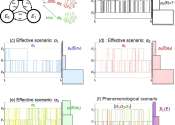The Santa Fe Institute (SFI) is an independent, nonprofit theoretical research institute located in Santa Fe (New Mexico, United States) and dedicated to the multidisciplinary study of the fundamental principles of complex adaptive systems, including physical, computational, biological, and social systems.
The Institute houses a small number of resident faculty, who collaborate with many affiliated and visiting scholars. Although theoretical scientific research is the Institute's primary focus, it hosts a number of complex systems summer schools, internships, and other educational programs throughout the year.
The Institute's annual funding is derived primarily from private donors, grant-making foundations, government science agencies, and companies affiliated with its Business Network.
The Santa Fe Institute was founded in 1984 by scientists George Cowan, David Pines, Stirling Colgate, Murray Gell-Mann, Nick Metropolis, Herb Anderson, Peter A. Carruthers, and Richard Slansky.
- Website
- http://www.santafe.edu
- Wikipedia
- http://en.wikipedia.org/wiki/Santa_Fe_Institute
Some content from Wikipedia,
licensed under CC BY-SA
Subscribe to rss feed









